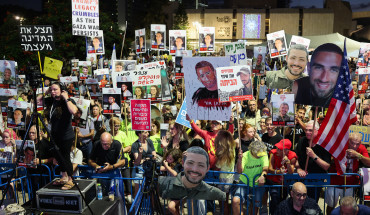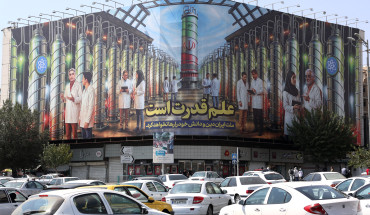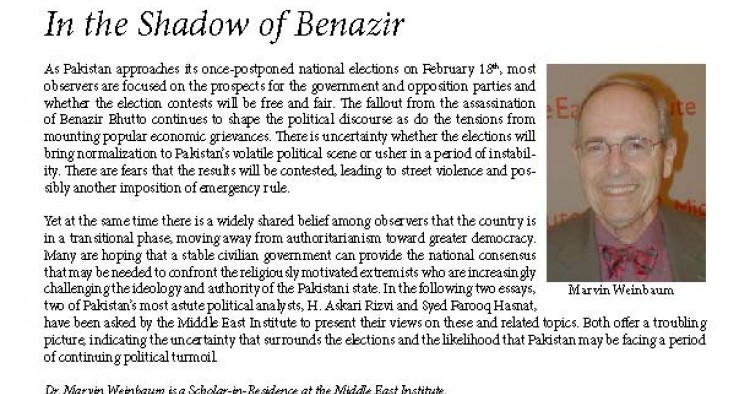Originally posted February 2008
Pakistan has had so few national elections in its 60-year history that every exercise to elect the national Parliament is exceptional. These relatively rare events are not only a mechanism for effecting a change of government but are also a means for putting the political process back on the rails and redefining the provisions of the 1973 constitution, which has been shredded by four periods of martial law. General (retired) Pervez Musharraf has declared martial law twice, ironically once against his own government.
The forthcoming election in Pakistan is exceptional in its own right, as it is scheduled to take place in particularly demanding circumstances. Of these circumstances, the December 27 assassination of Benazir Bhutto is clearly the most dramatic and arguably the most revealing. Following the assassination, electioneering came to an abrupt standstill and the elections themselves, originally scheduled for January 8, were postponed to February 18.
The Ministry of the Interior’s controversial explanation of Ms. Bhutto’s brutal murder spawned its own set of consequences, deepening the distrust of the Musharraf government. In fact, the vast majority of Pakistanis rejected the official explanation. The government’s subsequent revised explanation — including President Musharraf’s suggestion that it was Ms. Bhutto’s own fault that she had been shot — fueled more confusion and outrage.
In a recent Gallup International poll, more than 58% of Pakistani respondents blame the government for the assassination while only 17% believe that militant groups were responsible for her removal from the political scene. Benazir’s husband, Asif Zardari, has called for a United Nations inquiry modeled after the inquiry into the assassination of former Prime Minister of Lebanon Rafiq Hariri — an idea the Musharraf government opposes.
The handling of Benazir’s murder will have a huge impact on the national elections. It is expected that there will be a large sympathy vote for the Pakistan People’s Party (PPP) and that the Pakistan Muslim League (PML-Q), a protégé of Musharraf, will suffer a severe setback. Benazir’s removal has strengthened the suspicion that the Q League, supported by Musharraf and his interim government, will manipulate the elections to their benefit.
Neither the fears of Musharraf and his supporters nor the suspicions that they might rig the elections are misplaced. During her last days, Benazir Bhutto (along with Nawaz Sharif) had generated a healthy political process and had electrified the people, much to the chagrin of the establishment. It had seemed that Pakistan was on track to re-establish its institutions and to revive the constitution in its original shape. Musharraf admitted in a CBS television interview that he was shocked — and no doubt unnerved — when Ms. Bhutto returned to Pakistan to contest the elections. In fact, the establishment had wanted to keep Benazir and Nawaz out of Pakistan so that they could entrench the “King’s Party” in the Parliament with a comfortable margin, ideally securing a two-thirds majority that would preserve Musharraf’s hold on power and policy prerogatives.
Fearing that his handpicked party would not be able to obtain a two-thirds or even a simple majority in the parliament, Musharraf panicked and took a number of steps to solidify his position. These steps included the imposition of martial law, the dismissal from service of Supreme Court justices who objected to his extra-constitutional decrees and their placement under house arrest (along with their families), the gagging of the media, a brutal crackdown on civil society, the abrogation of legal provisions standing in the way of his becoming President while simultaneously holding the position of the Army Chief of Staff, and hurriedly packing the Supreme Court with individuals who condone these acts. By the time Musharraf lifted martial law and removed his army uniform, he had acquired all the necessary powers to manipulate the elections and to impose himself as President for another five years.
It was widely believed that the Q League was on the verge of being routed when the Bhutto assassination took place. Leaders of the Q League were no longer even addressing public meetings and were confined to a few places in Punjab. In contrast, Benazir, who was a national figure and a representative of all the provinces of Pakistan, had managed to achieve a reasonable understanding with former Prime Minister Nawaz Sharif, the leader of the Pakistan Muslim League (PML-N). It was expected that both the major parties would form a coalition government after the elections. Clearly, Musharraf had other ideas.
On the eve of the Bhutto assassination, the US-brokered “deal” between Musharraf and Benazir lay in tatters, as trust between these two contrary personalities had drained away. In this respect, the Bush Administration had totally misread the dynamics of Pakistani politics. Nor, apparently, did the administration understand that Benazir derived her support from the people, who in turn disliked, and even hated, Musharraf for his dictatorial rule. By pushing Ms. Bhutto to become the civilian face of a military dictator, the Bush Administration exposed her to various risks in Pakistan. And as subsequent events have proved, Washington has little or no leverage, either with the military dictator or on the domestic dynamics of Pakistan.
The national elections of 2008 are bound to be highly controversial. On a number of occasions just before her assassination, Benazir had stated that although she had strong evidence the elections would be rigged, she would participate in them so as not to leave the field open for the government party. All the political parties, with the exception of those few who support Musharraf, have expressed their apprehension about the impartiality of the elections. They further believe that free elections cannot be held while Musharraf is at the helm.
Nonetheless, the circumstances surrounding the elections, if not the elections themselves, are illuminating. They reveal that the conflict in Pakistan today, contrary to many accounts in the Western press, is not between the “liberal” and the “orthodox” segments of society, but between the democrats and the dictatorial establishment. And, as a symbol of democracy and freedom, Benazir Bhutto will cast a huge shadow over the elections of 2008, no matter how effectively they are rigged.
The Middle East Institute (MEI) is an independent, non-partisan, non-for-profit, educational organization. It does not engage in advocacy and its scholars’ opinions are their own. MEI welcomes financial donations, but retains sole editorial control over its work and its publications reflect only the authors’ views. For a listing of MEI donors, please click here.













